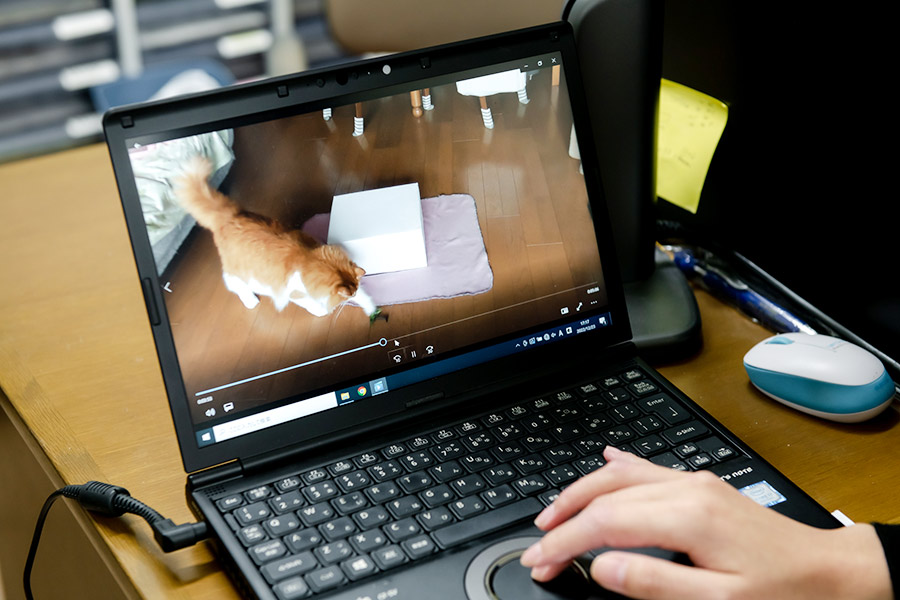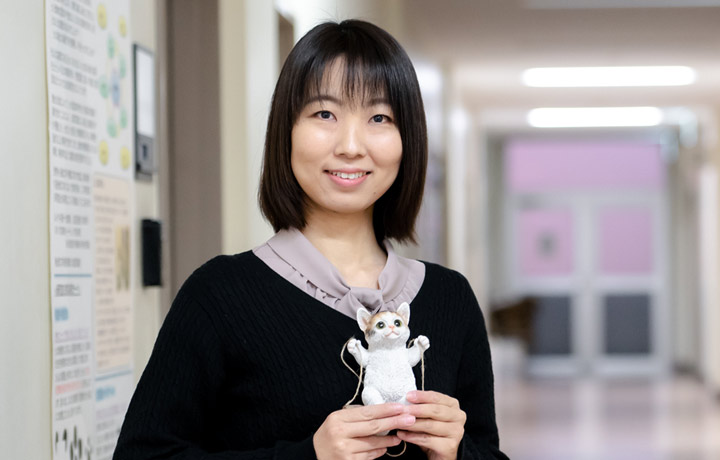“I wish I could understand how my cats are feeling,” or “What are they thinking about?”
You may have thought while observing your feline companions? Associate Professor Arii Watanabe of Chiba University is studying the psychology of animals to provide answers to these questions. In this interview, we will delve into her research on cats −our long-time friends and family members who are still shrouded in mystery.
A passion for animals leads to research into animal minds

Please tell us about your specialty, comparative cognition.
In order to clarify what kind of cognitive abilities humans and non-human animals have, I conduct research based on animal experiments called “behavioral experiments.” This field of study is often referred to as “animal psychology.” In behavioral experiments, we examine the cognitive abilities of animals by observing their responses in specific situations without conducting invasive experiments that could harm them.
One of my research topics is called “metacognition.” I mainly study pigeons to explore whether animals have consciousness similar to humans, and whether they are aware of their own thought processes. Specifically, I give animals a task and ask if they can solve the task or not. If they answer “I don’t know,” it means they acknowledge their own state of knowledge. By gradually making the task more difficult, I see to what extent they could understand.
In addition, I also study whether animals have episodic memory, and whether the emotion of “fear” is innate, that is, whether it was created in the process of animal evolution, or whether it is a result of experience.
What triggered you to pursue animal psychology?
I come from a family that has always owned cats since my grandparents’ generation. Furthermore, I spent my childhood in New Zealand, where I rode horses on a farm and went out to see wild animals on weekends. As a result of growing up with animals, my childhood dream was to communicate with them. Although everyone would just laugh whenever I expressed this desire, it remained a passion within me.
During my time as a student, I took courses in both zoology and psychology. However, I was frequently reminded that psychology was a field of understanding human beings. But then, one day, a professor introduced me to the field of comparative cognition, which examines human cognitive abilities by studying animal psychology and behavior. That’s how I found my current research field.
“NyanCog! (Cat Cognition)” Project Exploring Cognitive Ability in Cats

May I ask why you started this project?
Cats have a long history with humans, yet research on their cognition has not advanced as much as it has for some other animals. Many mysteries remain, and cats are often compared to dogs, saying, “Dogs can do this, but cats can’t.” However, is it true that dogs are more cognitively capable than cats? Or is it simply because there hasn’t been enough research on cats or because methods to study them have not been established yet? To answer these questions, I started this project in 2020.
Why hasn’t research on cats advanced?
One reason is that cats are difficult animals to work with. Dogs are much easier to study than cats because they respond well to treats and are cooperative, and concentrate well in experiments, making them ideal subjects for research. As a result, research on dogs has advanced much more than on cats. On the other hand, cats don’t always willingly cooperate in experiments, and researchers must find ways to encourage their participation.
What exactly are you doing in the project?
At first, I conducted experiments on gaze fixation. We often hear stories about cats watching TV, so I thought that if watching screens was enjoyable for them, I could use movies as a reward as a substitute for snacks to conduct experiments. Specifically, I visited the homes of cat owners who were willing to cooperate with the experiment, displayed moving stimuli for cats on a monitor, and observed how the cats reacted to the screen.
How was the result?
I found that whether or not cats look at a screen depends more on their individual personalities rather than the patterns of the stimuli. We asked cat owners to fill out a questionnaire about cats’ personalities, and the surprising result was that cats rated as “playful” by their owners hardly ever looked at the screen, while the cats thought to be “not very playful” tended to watch the screen more closely. It is possible that the “not very playful” cats are more cautious and stare at the screen to figure out what it is.
Cats, like humans, have individual personalities. This is often overlooked in animal research, which tends to focus on the average values of a species. This approach is particularly common in experiments involving animals such as pigeons. However, by comparing cat personalities, it has become clear that we should be asking how different types of cats behave rather than what cats do as species. In my next step of research, I plan to show more complicated movies to determine cats’ level of understanding.
In addition to studying cat personalities, I’m also exploring whether animals understand basic concepts of physics, “physical cause-and-effect relationships,” that are part of our everyday lives. For example, I am conducting experiments to see if animals understand that when we let go of an object, it falls to the ground or that an object hidden from their view still exists.
Future of the “NyanCog!” Project


Do you have any goals for future research in animal psychology?
I wish to continue focusing on the “NyanCog!” project. I am currently seeking additional paws, so if you have a cat and would like to cooperate with the experiment, please register on our website so that we can better understand cats together. In the short term, I would like to investigate whether there are differences in cognition between cats in cat cafes and domestic cats.
Looking towards the long term, I would like to use the perspective of animal psychology to clarify how the cognition of humans and non-human animals are shaped by the evolutionary process and environment.
Animal lovers are very welcomed
Lastly, please give a message to those who want to study animal psychology.
In this field, we conduct research that targets animals that can’t speak human language, so we need to consider what kind of method we should use to clarify what they are thinking. I have been struggling with it, but there is a great sense of fulfillment in it. There are various approaches to animal research, such as brain science and neuroscience, and some of them require the dissection of animals, but our laboratory only conducts behavioral experiments. For those who love animals, I am letting you know that you can also get involved with animals through the field of psychology.
I often get asked what this study is useful for, or whether it can make money. I would always say, by studying animals and comparing them to humans, we can deepen our understanding of humans. For instance, by examining the impulsiveness of animals, we can investigate what sets highly impulsive human individuals apart from less impulsive ones, which may help solve behavioral problems in people with mental illnesses. Pursuing such research may also lead to a better understanding of impulsive criminal behaviors.
In addition, it is also rewarding to contribute to the issues of how to build a better relationship between animals and humans.
Furthermore, even if you are not a student, if you love cats and want to know more about cats, let’s work together at “NyanCog!”








